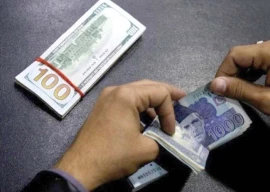
Service, which according to the World Trade Organisation (WTO), is the fastest growing sector of the global economy and contributes 70% to the global output. The services sector also accounts for a quarter of the total global trade and employs one third of the workforce.
The services sector is also important for Pakistan as it constitutes 58% of the country’s GDP. Pakistan also exported services worth $5.3 billion with a deficit of $3 billion in 2014. The sector has strong backward and forward linkages with other sectors of the economy, while it significantly contributes to cross-border trade as well.
Services complement the production process and are considered as the glue that binds various segments and components of the finished goods. In the production process, services can be found at various stages, from inception to the final consumption.
As the production process shows increasing fragmentation, the services sector is also scattered globally where advancement in information technology and communications have made it mobile and cost effective.
The increasing importance of services sector in the global value chain has created challenges for policymakers to understand its role and enable policies to support competitiveness of national firms.
Measuring service statistics is one of the biggest challenges faced by this sector. Countries usually measure trade in services through the balance of payment maintained by central banks. However, content of domestic services in the goods manufactured for exports is difficult to quantify.
Trend research data
The WTO secretariat, in collaboration with OECD, has developed Trade in Value-Added Database that sheds some light on the content of services in trade of goods.
In developed economies, the value addition or content of the services in exported goods is as much as 45%. For developing countries, this average is around 35%. This trend, where the services sector – domestic and imported – being a significant enabler in the manufacturing and production of goods, has led to the servicification of manufacturing and reclassification of industrial activities such as purchases, production, marketing, sales and customer relationship.
A number of analysts consider the servicification of manufacturing as a “game changer” where the research has shown sufficient empirical evidence that share of services in the industrial output has doubled in the last decade for developed countries.
The data from OECD research shows that contribution of services to manufacturing accounts for 50% of exports from US and the EU in 2014. This study also quantified the impact of barriers on import of services and concluded that there was a direct relationship between restrictions on the import and trade in manufacturing goods.
It means that countries that have placed restrictions on the import of services have undermined the capacity of their national manufacturing firms in exporting goods.
Hence we can conclude that manufacturing and export of goods is dependent on the availability of competitive services both domestic and foreign. The scholarship on the subject has sufficient empirical evidence that just reducing import tariff is not sufficient for export competitiveness.
In Pakistan, there has been an on-going debate on the competiveness of local firms where increasing challenges from competitors have prevented Pakistan to realise its export potential. It is important for the policymakers to realise that global competiveness is achieved not by defensive or protective approaches but through aggressive and bold steps through liberalising trade both goods and services.
This would require Pakistan to facilitate Foreign Direct Investment and take measures for ease of doing business. Pakistan would also be required to liberalise the visa regime and work permits so that professionals from abroad can visit and render services for national firms.
The writer is a civil servant with 20 years of experience on issues related to Pakistan’s trade and development
Published in The Express Tribune, April 27th, 2015.
Like Business on Facebook, follow @TribuneBiz on Twitter to stay informed and join in the conversation.
1731329418-0/BeFunky-collage-(39)1731329418-0-405x300.webp)
















COMMENTS (1)
Comments are moderated and generally will be posted if they are on-topic and not abusive.
For more information, please see our Comments FAQ